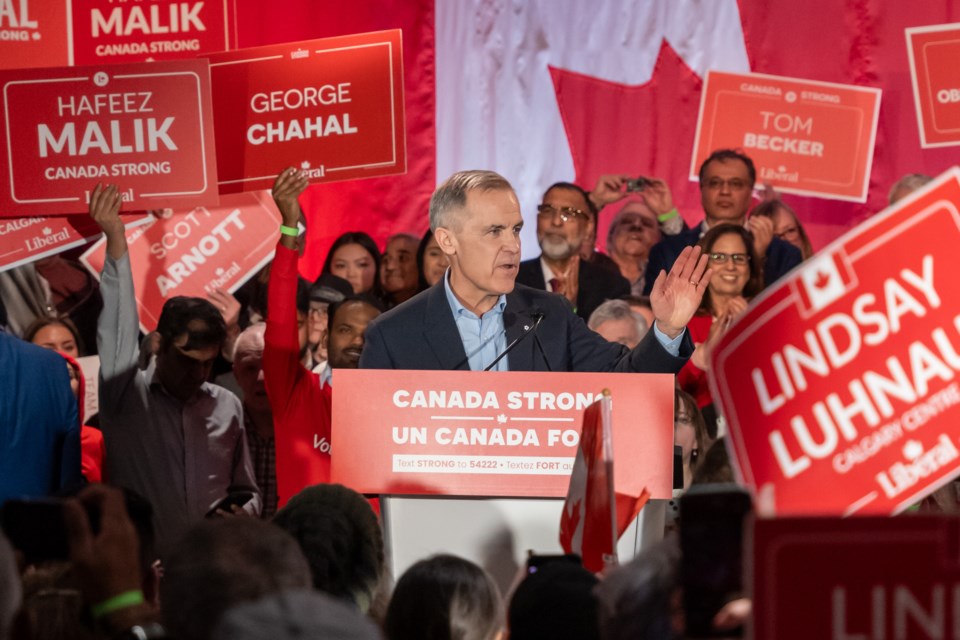Prime Minister Mark Carney worried environmentalists after he opened the door to changing federal impact assessment legislation and the oil and gas emissions cap in a recent interview.
“We will change things at the federal level that need to be changed in order for projects to move forward,” Carney told CTV News in an interview on Tuesday.
He was asked if this included Bill C-69 — the federal Impact Assessment Act — and a yet-to-be-finalized cap on oil and gas sector emissions.
“Absolutely, it could include both,” Carney responded.
This is a disappointing and concerning development, said Richard Brooks, climate finance director at Stand.earth.
As Carney tries to “build, baby build,” as per his election promises, it shouldn’t come at the expense of important environmental and climate safeguards, Brooks said.
“It should not be a free-for-all, Wild West kind of environment that we are moving towards, and he seemed to give indication that that was at least on the table,” he said.
Notably, Carney’s election platform did not mention the oil and gas emissions cap, but at the time, a party spokesperson told Canada’s National Observer that Carney was still committed to finalizing the regulations and only left it out of the platform because it was a Trudeau-era policy.
Carney did not specify whether he is just open to tweaking these two policies or whether he will consider scrapping them altogether.
“There could be some adjustments that get made to them that don't impact their effectiveness but make the roll-out of particular projects easier to do,” Brooks said.
“Or it could be a wholesale, ‘Let's gutt these two important pieces of policy and completely get rid of them.’ I mean, that's what big oil and gas based in Alberta and the governments of Alberta and Saskatchewan would very much like to see happen, but that would not be the responsible approach.”
Two of Alberta Premier Danielle Smith’s many demands of the federal government include scrapping both these policies, along with killing many other climate and environmental policies. On Monday, the day before Carney revealed his new cabinet, Smith announced the province is freezing its industrial carbon price indefinitely. The industrial carbon price has not been mentioned in the context of possible rollbacks by Carney, who emphasized its importance throughout the campaign.
The Impact Assessment Act is already being revised to address a Supreme Court ruling that found some parts of it encroached on provincial jurisdiction, and the oil and gas emissions cap is still being finalized, Keith Stewart, senior strategist with Greenpeace Canada, said in an emailed statement.
This could be Carney “trying to pre-empt a tantrum,” but “the pessimistic cynic in me sees this as yet another attempt to buy down the oil lobby's opposition to the energy transition and there's not enough money in the world to do that,” Stewart said.
“Smith needs a fight with Ottawa to distract from her scandals at home, so before signing any blank cheques for another pipeline, our new prime minister should remember how much love the old prime minister got for spending $34 billion to build a pipeline that still isn't full."
Former environment and climate change minister Steven Guilbeault was asked about Carney’s statement before a cabinet meeting on Wednesday and said “these are important conversations that we will need to have in the coming weeks.”
There is a lack of clarity at this stage, said Caroline Brouillette, executive director of Climate Action Network Canada, in an interview with Canada’s National Observer.
Carney “seems to be adopting an all-of-the-above energy strategy, both talking about the building of a pan-Canadian electricity grid and at the same time, doubling down on the volatile and dangerous fossil-fuelled status quo,” but he needs to pick a lane, she said. Both Smith and the province’s “well-resourced” oil and gas industry are being very loud and Canada needs a prime minister who will not cave to the loudest voices, she said.
This week, Smith blasted Carney for keeping the former environment minister in his cabinet, albeit in a different role. Guilbeault drew Smith’s ire again on Wednesday when he referenced the Trans Mountain pipeline not operating at full capacity, saying “before we start talking about building an entire new pipeline, maybe we should maximize the use of existing infrastructure.”
He also pointed out the previous federal government bought the Trans Mountain pipeline to ensure it was completed. This has not stopped Smith from fighting with Ottawa over all manner of climate policy and urging the federal government to scrap these policies in the name of national unity.
“It's getting increasingly clear that the major threat to Canadian unity is actually the fossil fuel industry and its political lackeys,” Brouillette said.
The oil and gas sector is Canada’s largest source of planet-warming greenhouse gas emissions.
Carney’s plan to grow domestic “conventional energy,” which is code for oil and gas production, is problematic, said Keith Brooks, programs director for Environmental Defence.
“[Carney] did assert that we can grow the production while reducing emissions, and I just— I don't think I've seen any credible analysis that suggests that that is true.
“It's keeping Canada from reaching its climate commitments … [so] we do need a cap on emissions from the oil and gas sector,” Brooks said.




